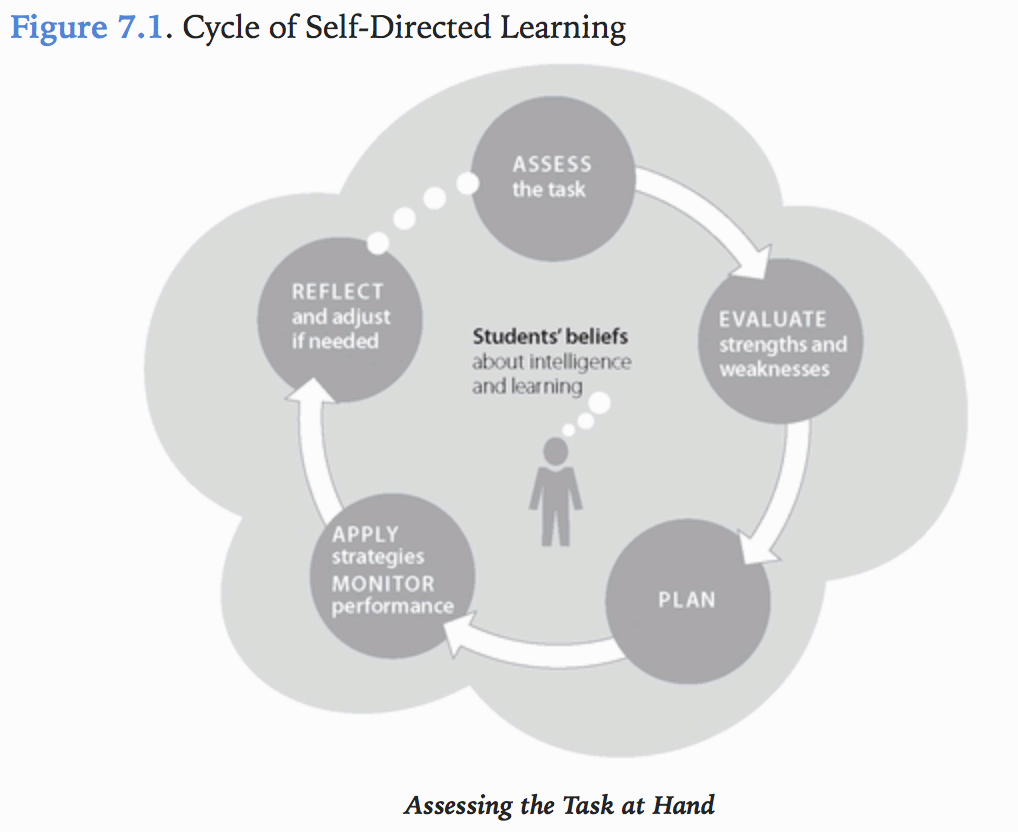Reading:
Ambrose, “How Learning Works.”
Chapter 7: “How do Students Become Self-Directed Learners?”
Summary
Growth mindset keeps coming to mind obviously, along with the notion that metacognition must be taught starting much earlier than college. But to do so, one must focus on first teaching it to the professors and teachers, who most likely were never taught the topic either. Beyond simply teaching about it, one must recognize that self-monitoring, self-evaluating, planning and so on, are cognitively demanding tasks that must come with high motivation to be adopted by someone who is already overloaded with their practice, research, and work. The same applies to the students who on top of learning the content, they must also think about their own learning. Therefore, we should strive to reduce the load of useless-once-memorized-its-lost content and increase the load of preparing children and young adults to learn and function in real life.
Notes
- Metacognition
- “Metacognition refers to “the process of reflecting on and directing one’s own thinking” (National Research Council, 2001, p. 78).”
- Students often do not know how to evaluate their own performance
- Not a subject that is included in classrooms
- How to become a self-directed learners
- “Principle: To become self-directed learners, students must learn to assess the demands of the task, evaluate their own knowledge and skills, plan their approach, monitor their progress, and adjust their strategies as needed.” (Ambrose, 2010)
- Cycle of Self-Directed Learning
- Not really a core-loop, more like a challenge-loop
- Assessing the task is actually quite hard to be done by students
- Evaluating personal performance is done poorly by low performing students
- Planning, if done at all, is done poorly by low performing students
- Apply Strategies and Monitor Performance your own behavior increases learning
- Reflecting on approach taken may not lead to trying another strategy
- Student’s beliefs also affect how much they learn… growth mindset

- Research finding:
- Metacognition is not used by students (or taught by the teachers)
- Strategies:
- Assess
- Be More Explicit Than You May Think Necessary
- Tell Students What You Do Not Want
- Check Students’ Understanding of the Task
-
Provide Performance Criteria with the Assignment
- Evaluate
-
Give Early, Performance-Based Assessments
-
Provide Opportunities for Self-Assessment
-
- Planning
-
Have Students Implement a Plan That You Provide
-
Have Students Create Their Own Plan When
-
Make Planning the Central Goal of the Assignment
-
- Apply & Monitor
-
Provide Simple Heuristics for Self-Correction
-
Have Students Do Guided Self Assessments
-
Require Students to Reflect on and Annotate Their Own Work
-
Use Peer Review/Reader Response
-
- Reflect
- Provide Activities That Require Students to Reflect on
- Prompt Students to Analyze the Effectiveness of Their Study Skills
- Present Multiple Strategies
- Create Assignments That Focus on Strategizing Rather Than Implementation
- Student’s beliefs
- Address Students’ Beliefs About Learning Directly
- Broaden Students’ Understanding of Learning Students
- Help Students Set Realistic Expectations
- Metacognition
- Modeling Your Metacognitive Processes
- Scaffold Students in Their Metacognitive Processes
- Assess